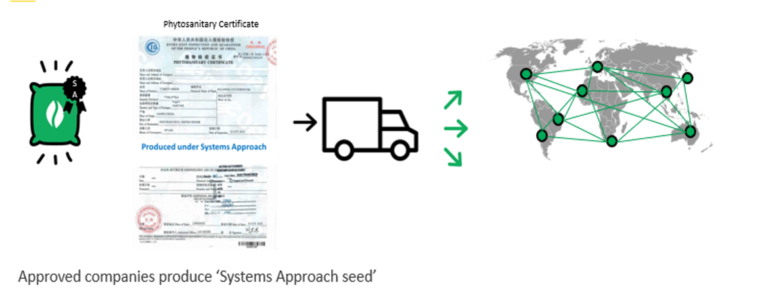Hot Topics
Vision and Mission
ISF has published the Vision and Mission Statement on a Systems Approach for Seeds. It provides a strategic framework for the development of a robust and harmonized global phytosanitary system for seeds while maintaining stringent plant health standards. This document serves as a foundation for continued collaboration and progress in aligning global phytosanitary measures with the needs of the seed sector.
The statement emphasizes the role of Quality Management Systems (QMS) in managing phytosanitary risks throughout seed production and trade. It highlights the importance of collaboration between National Plant Protection Organizations (NPPOs) and the private sector under the International Plant Protection Convention (IPPC) framework, with the goal of achieving multilateral recognition and broader adoption of the Systems Approach for Seeds.
ISF invites stakeholders to read the document to gain a deeper understanding of the Systems Approach and its potential to address current and emerging challenges in the international seed trade.
👉 Access the Vision and Mission Statement on a Systems Approach for Seeds
ISF calls on stakeholders to actively support this transformational approach. A multilateral Systems Approach for Seeds represents a shared commitment to innovation, collaboration, and resilience in global seed trade and plant health protection.
Increasing complexity to move seeds

Seed trade is growing rapidly. At the same time, many countries are defining new, non-harmonized, and more specific phytosanitary requirements for seeds. Risk avoidance is an important factor driving new regulations. The increase in trade as well as in phytosanitary requirements results in a high degree of complexity to move seed around the globe. Further, it increasingly strains the limited National Plant Protection Organization (NPPO) resources. There is a need to simplify and harmonize the current system to ship seed internationally to align with just-in-time seed production in a fast-paced global business.
Systems Approach

ISF supports a systems approach for seed as a necessary alternative measure in which seeds produced in a NPPO-approved supply chain can be imported and (re-)exported with a phytosanitary certificate without the specification of measures for individual pests. The ISF Expert Group on Systems Approach has released a concept paper (soon available in French, Japanese, and Spanish) on systems approach for seeds to achieve alignment among the public and the private seed sectors for an approach that simplifies and harmonizes phytosanitary certification for the international movement of seed. ISF strives for a system that will be multilaterally recognized, broadly adopted, and will recognize current industry processes which reduce phytosanitary risk when producing quality seed.
It is the goal of the international seed industry to work within the framework of the International Plant Protection Convention (IPPC) of the FAO as this will facilitate harmonization of the approach by the different NPPOs. ISF believes that a systems approach for seeds should be simple and easy to accept and implement by NPPOs and the seed industry while fulfilling the phytosanitary needs of both.
ISF proposes to use existing lists, such as the ISF Regulated Pest List, as a basis for a global pest list.
ISF Regulated Pest List
The ISF regulated pest list database is updated as and when more pest lists are completed, or new information is available. It is not expected that changes will be notified. In case of any litigation, ISF will not be held liable for the use of the database.
You can find further information on ISF Systems Approach initiative through the following videos:
‘A better way to move seed around the world’ (English with subtitles)
‘What would it take to make a systems approach work?’ (English with subtitles)
‘International Seed Trade: The road to a Systems Approach’ (English)
Seed Talks Exclusive Ep. 2 – “CPM15: An Industry Perspective” (English)
¿Qué se necesitaría para que un enfoque de sistemas funcione? (English with Spanish subtitles)
Feedback
For questions or feedback on the ISF concept paper, please send an e-mail to:
isf@worldseed.org
Subject Line: Systems Approach